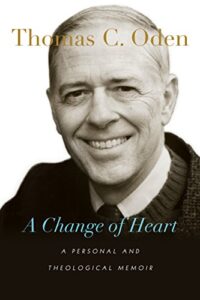On the Sunday before Pentecost 2019, I was preaching at a United Methodist Church in Columbus, Georgia. This church has two morning services so I spent the time between services in the pastor’s office. I noticed a copy of A Change of Heart by Thomas C. Oden on his desk. Oden wrote my favorite systematic theology, so I picked it up and began reading through it. Several months later someone gifted me a copy and I just recently read the entire book. It was fascinating!
Before I begin my brief review of A Change of Heart, let me remind you of an earlier review of The Rise of Theological Liberalism and the Decline of American Methodism by James Heidinger. Heidinger’s book discusses the ill effects of liberal theology on a movement. Oden’s book is a startling reflection of someone who lived and participated in the Methodist decline.
Oden was a Methodist from birth, reared in mid-America. It would seem that he was far from the liberal influences from the East, but he was not. He remembers that his experience in Methodist youth camps were “more to gain a vision of social justice than of personal religious experience”. He wrote that the Methodist youth movement was an extensive organization with “strong political convictions… designed for propaganda that promoted social change” (47). This influence challenge him to enter ministry “with the imagination of a revolution that… would essentially replace the traditional gospel” (48). The emphasis on political theology meant that “whenever I read the New Testament… I was trying to read it entirely without its crucial premises of incarnation and resurrection” (50). He wrote,
I habitually assumed that truth in religion was finally reducible to economics (with Marx) or psychological motives (with Freud) or self-assertive power (with Nietzsche). It was truly a self-deceptive time for me, but I had no inkling of its insidious dangers… I reasoned out of modern naturalistic premises, employing biblical narratives narrowly and selectively as I found them useful politically. The saving grace of God on the cross was not in my mix of life changing ideas (51).
The political theology that Oden embraced as a young man was “new birth without bodily resurrections and forgiveness without atonement.” The gospel was not “an event of divine salvation but about a human psychological experience of trust and freedom from anxiety, guilt and boredom” (86).
In the 1960s, Oden was deeply involved in the ecumenical movement embodied by the World Council of Churches. He tells us that the WCC actively promoted liberation movements, leftist politics and reduced the Christian call to repentance and discipleship to political action (113). During this period, Oden describes himself as “floating on the wave of secularization” in which theologians were “deconstructing the old religion in order to create a new religion” (80). He confesses that,
In my seminary teaching I appeared to be relatively orthodox, if by that one means using an orthodox vocabulary. I could still speak of God, sin and salvation, but always only in demythologized, secularized and worldly wise terms. God became the Liberator, sin became oppression and salvation became human effort. The trick was to learn to sound Christian while undermining traditional Christianity” (81).
Oden declared, “I had been enamored with novelty. Candidly, I had been in love with heresy”. Even so, in the early 1970s his “life unexpectedly turned around by an outpouring of grace” (140). The person that led him back to the Faith was a Jewish philosopher, Will Herberg, who rebuked him with the words, “You will remain theologically uneducated until you study carefully, Athanasius, Augustine and Aquinas… If you are ever going to become a credible theologian instead of a know-it-all pundit, you had best restart your life on firmer ground.” After this confrontation, Oden ironically reflects, “Why did it take a Jew to turn me to Christianity?” (136-137).
With this conversion, Thomas Oden became one of the great Christian theologians of the 20th century. His works include a three volume systematic theology, the Ancient Christian Commentary Series, the Ancient Christian Doctrine series, the Ancient Christian Texts series, and more. He led a return to Christian orthodoxy.
Oden’s memoir is significant because the liberalism of the late 20th century, which gave way to the presidency of Ronald Reagan and the pontificate of John Paul II, has found new life in our time. Liberal contextual and political theologies abound and Marxism is alive and well. In my judgment, the religious right has fallen into similar political temptations. My tribe, the Pentecostals, have lost the sense of divine encounter expressed in the words “saved, sanctified, and baptized in the Holy Spirit.” The religious right has learned well from the left to practice a selective reading of Scripture that promotes one’s politics. Sadly, both proclaim “a different gospel.”
Even so, Tom Oden leaves us with words of encouragement:
“The good news is that the seeds of God’s good news are planted already in every dying culture. What is ahead of postmodernity? No one knows, but whatever it is, it will not succeed in destroying the deep roots of Christian memory” (164).

